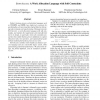122 search results - page 7 / 25 » Trust and technologies: Implications for organizational work... |
CSCW
2006
ACM
14 years 2 months ago
2006
ACM
Task dependencies drive the need to coordinate work activities. We describe a technique for using automatically generated archival data to compute coordination requirements, i.e.,...
CAISE
2008
Springer
13 years 10 months ago
2008
Springer
Today's business process orchestration languages such as WS-BPEL and BPML have high-level constructs for specifying flow of control and data, but facilities for allocating ta...
NORDICHI
2006
ACM
14 years 2 months ago
2006
ACM
Users should be involved in the development of information technology (IT) artifacts. However, this is challenging, especially in product development context, in which Human Compu...
HICSS
2006
IEEE
14 years 2 months ago
2006
IEEE
Although prior research has tended to dichotomize work teams as virtual or nonvirtual, most project teams today involve some mix of face-to-face and virtual interaction. We develo...
CHI
2011
ACM
13 years 18 hour ago
2011
ACM
Today, commodity technologies like mobile phones—once symbols of status and wealth—have become deeply woven into social and economic participation in Western society. Despite ...

